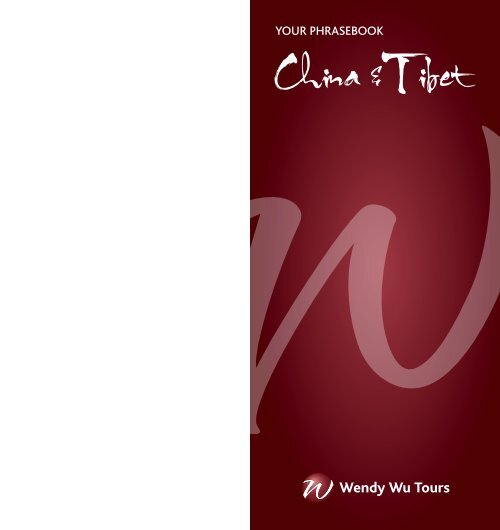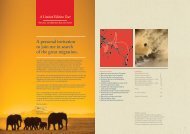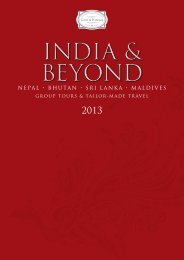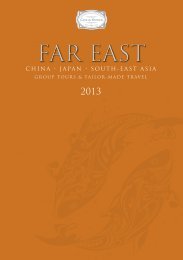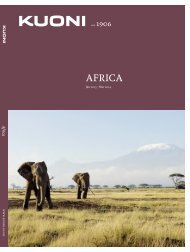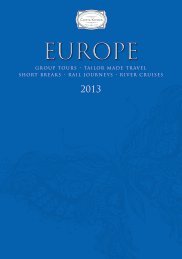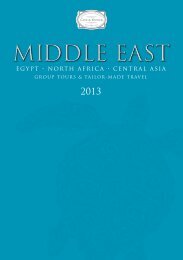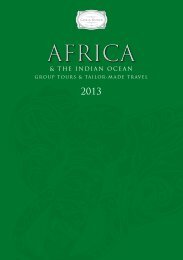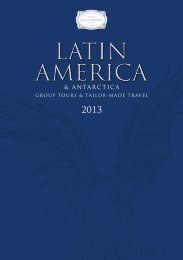YOUR PHRASEBOOK - Travel Club Elite
YOUR PHRASEBOOK - Travel Club Elite
YOUR PHRASEBOOK - Travel Club Elite
You also want an ePaper? Increase the reach of your titles
YUMPU automatically turns print PDFs into web optimized ePapers that Google loves.
<strong>YOUR</strong> <strong>PHRASEBOOK</strong><br />
Giant Pandas, Chengdu<br />
25
GUIDE TO PRACTICAL CHINESE<br />
Something else to help you is the pronunciation of the ‘initials’<br />
and ‘finals’, try these pronunciation exercises:<br />
It is believed that Chinese writing originated almost four<br />
thousand years ago and that the spoken language goes back<br />
many thousands of years before that, thus Chinese is one of the<br />
world’s oldest languages and even today one of the most widely<br />
used living languages.<br />
Chinese belongs to the Sino-Tibetan family of languages. The<br />
standard Chinese language, spoken by almost 95% of the<br />
population of China is ‘Hanyu’, literally ‘language of the Han’.<br />
Standard Chinese is also known as ‘Putonghua’, its official<br />
designation. In the UK we know it as “Mandarin”.<br />
‘Putonghua’ is based on the northern dialect, using the dialect<br />
of Beijing as the basis for its pronunciation. Learning to speak<br />
a small amount of this fascinating language when you are<br />
travelling in China will not only be enjoyable and fun for you,<br />
but also shows the Chinese people your respect for their local<br />
culture and they will warm to you for your efforts.<br />
We have tried in this phrase book to stick to the words and<br />
phrases that you will most commonly want to use, but with the<br />
help of the few verbs we have included here, you could expand<br />
your vocabulary and speaking ability much further. We have<br />
added space at the back of this book for you to add your own<br />
additional words. Ask your National Escort or Local Guide for a<br />
word and then write it down in this book and you are set to go.<br />
For each word or phrase we have given the English followed by<br />
the Anglicised Chinese equivalent or ‘Pinyin’, then a phonetic<br />
version that should make it easier for you to pronounce.<br />
First though you need to know about the four tones as<br />
follows:<br />
- a flat inflection v a down and up inflection<br />
/ an upward inflection \ a downward inflection<br />
In the Chinese language the four tones change the meaning<br />
of a word here are some examples of how the tone can make<br />
a huge difference.<br />
shuĭ = water<br />
xīn = heart<br />
èr = two<br />
shuì = to sleep<br />
xìn = letter<br />
ér = son<br />
Initials:<br />
b = b in boat<br />
p = p in port<br />
m = m in mother<br />
n = n in nut<br />
l = l in lean<br />
h = h in heart<br />
d = d in dopey<br />
t = t in turn<br />
g = g in goal<br />
k = k in kennel<br />
f = f in fort<br />
Finals:<br />
a = a in father<br />
e = ea in heard<br />
i = ee in peel<br />
o = a in call<br />
u = oo in pool<br />
ao = ow in cow<br />
en = en in open<br />
ie = ye in yes<br />
in = in in pin<br />
ing = ing in ping<br />
uo = wa in water<br />
ei = a in late<br />
ou = ow in sow<br />
an = an in answer<br />
ang = ung in dung<br />
eng = eng in length<br />
iao = yow<br />
iou = yo<br />
ai = i in high<br />
uai = why<br />
ong = ong in long<br />
ia = ya in yard<br />
zh<br />
ch<br />
sh<br />
r<br />
j<br />
q<br />
x<br />
z<br />
c<br />
s<br />
ian<br />
iang<br />
uei<br />
uen<br />
un<br />
er<br />
iong<br />
ua<br />
uan<br />
uang<br />
ü<br />
üe<br />
ün<br />
= j in juice<br />
= ch in chase<br />
= sh in shoot<br />
= r in race<br />
= j in jim<br />
= ch in chase<br />
= sh in shirt<br />
= ds in heads<br />
= ts in hats<br />
= s in sat<br />
= yen<br />
= young<br />
= way<br />
= when<br />
= win<br />
= er in her<br />
= yong<br />
= wa in wand<br />
= one<br />
= u in mule with<br />
ung in dung<br />
= This is a tough<br />
letter as we don’t<br />
have a similar<br />
sound in the<br />
English language<br />
it is more like<br />
a sound in the<br />
French or German<br />
languages. Try<br />
pursing your lips<br />
and saying ‘ee’.<br />
= ü with ye in yes<br />
= ü with in in thin<br />
26 27
getting started<br />
All phrases throughout this booklet are set out in the<br />
following order;<br />
ENGLISH<br />
PINYIN<br />
PHONETIC<br />
Hello or Hi<br />
nĭ hăo<br />
knee how<br />
The first thing to know is the various forms of greeting:<br />
Hello or Hi<br />
nĭ hăo<br />
knee how<br />
How are you?<br />
nĭ hăo ma?<br />
knee how mar<br />
If you are asked the question “How are you?” then the<br />
answer is:<br />
I am very good<br />
wŏ hĕn hăo<br />
war hun how<br />
If you ask the question first and ask “How are you?” the<br />
response will probably be:<br />
I am very good, and you?<br />
wŏ hĕn hăo, nĭ ne?<br />
war hun how, knee ner<br />
To which the final response will be:<br />
I am also very good<br />
yĕ hĕn hăo<br />
yer hun how<br />
So the full conversation will be:<br />
(you)<br />
(them)<br />
(you)<br />
knee how mar?<br />
war hun how, knee ner?<br />
yer hun how<br />
Practice this with your partner or a friend.<br />
Here are the words you have learnt:<br />
You<br />
nĭ<br />
knee<br />
Good; well; fine<br />
hăo<br />
how<br />
add to the end of a word or phrase to pose a question:<br />
PINYIN<br />
PHONETIC<br />
ma<br />
mar<br />
I; me Very<br />
wŏ<br />
hĕn<br />
war<br />
hun<br />
forms an elliptical question:<br />
PINYIN<br />
PHONETIC<br />
Too; also<br />
yĕ<br />
yer<br />
ne<br />
ner<br />
Here are some more greeting words that you can<br />
easily use:<br />
Pleased to meet you<br />
rènshi nĭ hĕn gaoxìng<br />
earn she knee hun gow shing<br />
Good morning<br />
zăoshàng hăo<br />
sow shung how<br />
Goodbye<br />
zàijiàn<br />
sigh shun<br />
Good evening<br />
wănshàng hăo<br />
one shung how<br />
You (formal)<br />
nín<br />
neen<br />
‘nín’ is the polite form of<br />
‘ní’, commonly used to refer<br />
to an elderly or senior<br />
person during a<br />
conversation or to a person<br />
of a similar generation when<br />
speaking on a formal<br />
occasion. It is also a good<br />
form to use just to show<br />
good manners and respect.<br />
28 29
Now you have learnt how to greet someone you may like to<br />
learn something about them, their name, where they are<br />
from or what they do for a living.<br />
The following words and phrases should help you with that.<br />
May I ask your name?<br />
qĭngwèn, nín guìxìng<br />
ching when nin gwee shing<br />
The above form of asking someones name is quite formal<br />
and would be answered thus:<br />
My family name is Brown, given name John<br />
wŏ xìng Brown, jiào John<br />
war shing Brown, jow John<br />
A less formal and easier way of asking a name is thus:<br />
What’s your name?<br />
nĭ jiào shénme míngzi<br />
nee jow shenmer minzar<br />
Where are you from?<br />
What is your country?<br />
nĭ shì nă guó rén<br />
knee sher nar gorun<br />
If you are asked this question your answer would be:<br />
I be wŏ shì war sher<br />
Australia<br />
Àodàlìyà rén<br />
owdarleeyar run<br />
England<br />
Yīnggúo rén<br />
eeingor run<br />
New Zealand<br />
Xīnxīlán rén<br />
shinshilun run<br />
South Africa<br />
Nánfēi rén<br />
nunfay run<br />
Ireland<br />
Àiĕrlán rén<br />
iairlan run<br />
Scotland<br />
Sūgēlăn rén<br />
sir ger larn run<br />
Canada<br />
Jiānádà rén<br />
geeunudar run<br />
Chinese<br />
Zhōngguó rén<br />
dzonggur run<br />
What do you do?<br />
What is your work?<br />
nĭ shì nă gongzuò?<br />
knee sher na gondzer<br />
You have learnt a very important word in this last exercise<br />
and that is the verb “to be”.<br />
Actually, in the Chinese language, unlike in English, there<br />
is only one word for all the parts of the verb “to be” and<br />
that is:<br />
To be<br />
shì<br />
sher<br />
Thus:<br />
I am<br />
wŏ shì<br />
war sher<br />
You are<br />
nĭ shì<br />
knee sher<br />
He is<br />
tā shì<br />
ta sher<br />
She is<br />
tā shì<br />
ta sher<br />
They are<br />
tāmen shì<br />
tar mun sher<br />
We are<br />
wŏmen shì<br />
war mun sher<br />
The Chinese word shì is the equivalent of the English verb<br />
“to be” and describes a person.<br />
This should not be confused with another very useful<br />
Chinese word zaì which is “to be in a location” and can be<br />
used to express the English equivalent of; here, there, in,<br />
on, at.<br />
30 31
Let us review some more new words you have learnt:<br />
May I ask?<br />
qĭngwèn<br />
ching when<br />
You/your (formal)<br />
nín<br />
neen<br />
What<br />
shénme<br />
shun mer<br />
Name (informal)<br />
míngzi<br />
mun zer<br />
Name (family)<br />
guìxìng<br />
gwee shing<br />
To be<br />
shì<br />
sher<br />
He<br />
tā<br />
ta<br />
She<br />
tā<br />
ta<br />
They<br />
tāmen<br />
tar mun<br />
We<br />
wŏmen<br />
war mun<br />
Girl friend<br />
nŭ péngyou<br />
noo pung yo<br />
No; not<br />
bù<br />
boo<br />
Want<br />
yào<br />
yow<br />
Hence:<br />
Don’t want<br />
bù yào<br />
boo yow<br />
Understand<br />
dŏng<br />
dong<br />
Hence:<br />
I don’t understand<br />
bù dŏng<br />
boo dong<br />
Hence:<br />
Do you understand<br />
dŏng bù dŏng<br />
dong boo dong<br />
Today<br />
jīntiān<br />
jean tea arn<br />
Tomorrow<br />
míngtiān<br />
mean tea arn<br />
Tonight<br />
jīnwăn<br />
jean one<br />
Name (given)<br />
jiào<br />
jow<br />
Here are some other words you may find useful:<br />
This<br />
zhè<br />
jer<br />
That<br />
nà<br />
nar<br />
Which<br />
nă<br />
nar<br />
Who<br />
shéi<br />
shay<br />
His/hers<br />
tā de<br />
tar der<br />
Theirs<br />
tāmen de<br />
tar mun der<br />
Both; all<br />
dōu<br />
der<br />
Friend<br />
péngyou<br />
pung yo<br />
Asking the whereabouts of something or someone:<br />
Where is the toilet?<br />
qĭngwèn cèsuŏ zài nă?<br />
ching wen, zer swore sigh nar<br />
Where is John?<br />
qĭngwèn John zài nă?<br />
ching wen, John sigh nar<br />
Where is the dining room?<br />
qĭngwèn cāntīng zài nă?<br />
ching wen, tan ching sigh nar<br />
Where is the market?<br />
qĭngwèn shāngchăng zài nă?<br />
ching wen, sun shung sigh nar<br />
Mine<br />
wŏ de<br />
war der<br />
Yours<br />
nĭ de<br />
knee der<br />
Male<br />
nán<br />
nun<br />
Boy friend<br />
nán péngyou<br />
nun pung yo<br />
When asking a question of someone, always start with<br />
the Chinese word qngwèn which means literally “may I ask?”<br />
You can see from this that with just these few small words<br />
you should be able to find directions to most places and<br />
things.<br />
32 33
SHOPPING<br />
CAFES & RESTAURANTS<br />
I would like to buy water<br />
wŏ xĭang măi shŭi<br />
war shung my shway<br />
Do you have water?<br />
nĭ yŏu shui mă?<br />
knee yo shway mar<br />
Just looking<br />
wŏ kàn yíxià<br />
war carn yeesha<br />
How much does this cost?<br />
zhèìge dūoshăo qiań?<br />
dzersher dwoorshow chian<br />
It is too expensive<br />
taì guì le<br />
tie gway ler<br />
Excuse me<br />
duìbuqĭ<br />
durbuchee<br />
Miss<br />
xiăojiĕ<br />
show share<br />
I want<br />
wŏ yaò<br />
war yow<br />
Thank you<br />
xièxie<br />
share share<br />
Do you have coffee?<br />
nĭ yŏu kāfēi ma?<br />
knee yo car fay mar<br />
I want coffee<br />
wŏ yào kāfēi<br />
war yow car fay<br />
We all want coffee<br />
wŏmen dōu yào kāfēi<br />
woo men doo yow car fay<br />
No milk thank you<br />
bù jiā niúnăi xièxie<br />
boo jyar new nigh share share<br />
I would like to drink beer<br />
wŏ xiăng hē pí jiŭ<br />
war shung her pea jo<br />
Please bring a knife & fork?<br />
qĭng ná chāzi hé dāozi?<br />
ching nar shazi her dowzer<br />
Waiter!<br />
fúwùyuán<br />
foowoo yoo arn<br />
Do you have an English menu?<br />
nĭmén yŏu yīngwén càidān ma?<br />
knee men yo yeen gwun ky dun mar<br />
The bill please<br />
măidān<br />
maydarn<br />
Very good<br />
hĕn hăo<br />
hun how<br />
Not good<br />
bù hăo<br />
boo how<br />
No thank you<br />
bù xièxie<br />
boo share share<br />
In the dictionary at<br />
the end of the phrase<br />
book you will find<br />
most shopping items<br />
listed that you may<br />
want to buy and you<br />
can substitute in the<br />
above phrases.<br />
34 35
Let us review some more new words you have learnt:<br />
toilet<br />
cèsuŏ<br />
zer swore<br />
where is<br />
zài nă?<br />
sigh nar<br />
dining room<br />
cāntīng<br />
tan ching<br />
market<br />
shāngchăng<br />
sun shung<br />
water<br />
shuĭ<br />
shway<br />
looking<br />
kàn<br />
carn<br />
excuse me<br />
duìbuqĭ<br />
durbuchee<br />
Miss<br />
xiăojiĕ<br />
show share<br />
want<br />
yào<br />
yow<br />
milk<br />
niúnăi<br />
new nigh<br />
Waiter!<br />
fúwùyuán<br />
foowoo yoo arn<br />
Cold<br />
lĕng<br />
lung<br />
Beer<br />
pí jiŭ<br />
pea jo<br />
menu<br />
càidān<br />
ky dun<br />
numbers<br />
Once you have learnt the numbers 1 to 10 you can<br />
count easily to 99.<br />
ENGLISH PINYIN PHONETIC<br />
1 yī ee<br />
2 èr are<br />
3 sān sun<br />
4 sì sir<br />
5 wŭ woo<br />
6 Liù lee oo<br />
7 qī chee<br />
8 bā bar<br />
9 jiŭ jee oo<br />
10 shí sher<br />
11 shíyī sher ee<br />
12 shí’èr sher are<br />
13 shísān sher sun<br />
and so on to 19 and then:<br />
20 èrshí are sher<br />
21 èrshíyī are sher ee<br />
and so on to 29 then:<br />
30 sānshí sun sher<br />
40 sìshí sir sher<br />
and so on to 99 then:<br />
100 yībăi ee buy<br />
thank you<br />
xièxie<br />
share share<br />
good<br />
hăo<br />
how<br />
coffee<br />
kāfēi<br />
car fay<br />
36 37
DICTIONARY<br />
You may find this dictionary useful when practising your Mandarin<br />
skills, or whilst out shopping. If there are any specific words you want<br />
to know that are not shown here, simply ask your National Escort or<br />
Local Guide to write them down for you in the space provided.<br />
ENGLISH PINYIN PHONETIC<br />
A.<br />
Accident shìgù sher goo<br />
Ache téng tung<br />
Adaptor chāzuò char sor<br />
Address dìzhĭ der sher<br />
Allergic guomin gwor meen<br />
Antibiotics kàngjūnsù kung joon soo<br />
Apple píngguŏ peen gwor<br />
Aspirin āsīpīlín arshee peeleen<br />
ATM zÌdòng qŭkuăn ji seedung chuchuan gi<br />
B.<br />
Bad huài who eye<br />
Bakery miànbāo diàn meeun bow deearn<br />
Banana xiāngjiāo sheeung geeow<br />
Band aid chuàngkĕtiē chooung kertay<br />
Bank yínháng yeen hung<br />
Bar jiŭbā she ooba<br />
Beer píjiŭ pee joe<br />
Black hēi sè hay sher<br />
Blue lánsè larn sher<br />
Boiled water kāishuĭ ky shwai<br />
Bookshop shūdiàn shu dee arn<br />
Bread miànbāo mee arn bow<br />
Brown hèsè her sir<br />
Buy măi may<br />
C.<br />
Cabin kècāng cur chung<br />
Cake dàn gāo darn gow<br />
Camera zhàoxiàngjī show shang gee<br />
Change (money) duìhuàn dway one<br />
Cheese năilào nay lou(d)<br />
Chemist yàodiàn yow deearn<br />
Chilli làjiāo lar gee ow<br />
Chocolate qiăokèlì show ker lee<br />
Chopsticks kuàizi kway see<br />
Coffee kāfēi car fay<br />
Cold lĕng lung<br />
Cough drops késou táng kay sue tung<br />
Credit card xìnyòngkă sheen yerng car<br />
Cup bēizi bay sir<br />
ENGLISH PINYIN PHONETIC<br />
D.<br />
Damp cháoshī chow sher<br />
Dark àn arn<br />
Deaf lóng long<br />
Delicious hăochī how chee<br />
Dentist yáyī eear yee<br />
Diabetes tángniàobìng tung knee ow beeng<br />
Dirty zāng darng<br />
Doctor yīshēng yee shung<br />
Dollar yuán you arn<br />
Double bed shuāngrén chuáng shoo arn grun choo arng<br />
E.<br />
Earache ĕrduo téng er duoor toong<br />
Eat chī chee<br />
Egg jīdàn shee done<br />
Electricity diàn dee arn<br />
Elevator fútī foo tee<br />
Empty kōngde koong der<br />
Enough gòu le gow ler<br />
Exchange (rate) duihuanlü dew one ler<br />
Excuse me duìbùqĭ doer ber chee<br />
Expensive guì gwee<br />
Eye drops yănyàoshuĭ yun yow shwee<br />
F.<br />
Fan (electric) diànshàn de earn sharn<br />
Far yuăn you arn<br />
Fast kuài queue eye<br />
Fever fāshāo far show<br />
Fire huŏzāi hwores eye<br />
Fish yú eeyou<br />
Flower huā who ar<br />
Forget (I forget) wŏ wàng le war wung la<br />
Fork chāzi char zer<br />
Fresh xīnxiān shin shee arn<br />
Fruit shuĭguŏ shooi gwor<br />
Fruit Juice guŏzhī gwor jer<br />
Funny hăoxiào how shee ow<br />
G.<br />
Genuine zhēnde jern der<br />
Glass bēizi bay der<br />
Good hăo how<br />
Green lüse loorsa<br />
38 39
ENGLISH PINYIN PHONETIC<br />
H.<br />
Hair tóufa tal far<br />
Hairbrush fàshuā far shoo are<br />
Hairdresser lĭfàdiàn lee far deearn<br />
Handbag shŏutíbāo shoo tee bough<br />
Happy gāoxìng gow shing<br />
Hard (not soft) yìng eing<br />
Headache tóuténg too turn<br />
Heater qŭnuănqi choo non chee<br />
Heavy zhòng jong<br />
Help! Jiùmìng! Gee oo meeng<br />
Honey fēngmì fern g me<br />
Hot rè r (rolled r)<br />
Hot water rèshuĭ r (rolled r) shway<br />
Husband zhàngfu jung foo<br />
I.<br />
Ice bīng beeng<br />
Ice cream bīngqílín beengkeeleen<br />
Incorrect búduì boo dooee<br />
Indigestion xiāohuàbùliáng show har boo leeang<br />
Insect repellent chúchóngjì choo choong gee<br />
J.<br />
Jacket duănshàngyī dooarn sharn gyee<br />
Jade yù eeyoo<br />
Jam guŏjiàng gwo gee arng<br />
Jasmine Tea molihuacha mall eehooacha<br />
Juice zhi jee<br />
K.<br />
Key yàoshi yow she<br />
Knife dāozi dowsi<br />
L.<br />
Lamb (meat) yángròu yarn growl<br />
Lamp diàndēng deearn dung<br />
Leader lĭngdăo leeng dow<br />
Leather pígé pee ger<br />
Lemon níngméng neeng merng<br />
Lipstick kŏuhóng cow hong<br />
Litre shēng shung<br />
Lose diū dee oo<br />
Loud chăo chow<br />
Lunch zhongfàn jarngfarn<br />
ENGLISH PINYIN PHONETIC<br />
M.<br />
Magazine zázhì sarjee<br />
Mail jì gee<br />
Manager jīnglĭ jeenglee<br />
Married yĭhūn yee hoon<br />
Meat zòu sow<br />
Melon guā gooa<br />
Menu càidān sigh darn<br />
Milk niúnăi new nigh<br />
Mineral water kuàngquánshuĭ kooarn charn shway<br />
Music yīnyuè yeen yooer<br />
My wŏde war der<br />
N.<br />
Name xìngmÍng sheeng meeng<br />
(to) Need xūyào shoo yow<br />
Newspaper bàozhĭ bowjee<br />
No bù boo<br />
None wúyī woo yee<br />
Noodles miàntiáo meearnteeow<br />
Notebook bĭjìbĕn beegeebun<br />
O.<br />
Okay hăo how<br />
Old (thing) jiù geeoo<br />
Orange (fruit) júzi joosee<br />
Orange juice júzĭzhī jooseejee<br />
Overcoat dàyī daryee<br />
P.<br />
Padlock guàsuŏ gwoswar<br />
Pain tèngtóng tung toong<br />
Paper (writing) xìnzhĭ sheenjee<br />
Passport hùzhào hoojow<br />
Pastry gāodiăn gowdeearn<br />
Pastry shop gāodiănpù gowdeearnpoo<br />
Peach táozi t ow dsee<br />
Pen bĭ bee<br />
Photo zhàopiàn jowpeearn<br />
Pillow zhĕntóu jernt ow<br />
Plate pánzi parn dsee<br />
Police jĭngchá jeeng char<br />
Police station pàichūsuŏ pie chew swar<br />
Post office yóujú yow joo<br />
Problem wèntí wern tee<br />
Pure chúnde choonder<br />
40 41
ENGLISH PINYIN PHONETIC<br />
Q.<br />
Quick kuài koo eye<br />
Quiet ānjìng arn jeeng<br />
R.<br />
Raining (its) xià yŭ le she ar you ler<br />
Razor tìdāo tee dow<br />
Razor blades tìdāo piàn tee dow pee arn<br />
Receipt shōujù show joo<br />
Red hóng sè horn sir<br />
Repair xiū she oo<br />
Restaurant fànguăn fung ooarn<br />
Room fángjiān fung jeearn<br />
Room number fángjiān hàomă fung jeearn howma<br />
S.<br />
Safety pin biézhēn beeurjern<br />
Same yīyàng yee yung<br />
Scrambled egg chăojidàn chow ji dun<br />
Shampoo xĭfàjì shee fajee<br />
Shirt chènshān chun sharn<br />
Shoe xié sheer<br />
Silk sīchóu seeshow<br />
Sorry duìbùqĭ doy berchee<br />
Spicy là lar<br />
Spoon sháozi shower zer<br />
Sugar táng tung<br />
T.<br />
Tailor cáiféngdiàn ky fung deearn<br />
Tea chá char<br />
Telephone diànhuà dee arn hoo ar<br />
That nèige ner ger<br />
Thirsty kŏukĕ cow cur<br />
This zhèige jer ger<br />
Time shíjiān shee jeearn<br />
Toast kăomìanbāo cow meearn bow<br />
Today jīntiān jeen tee arn<br />
Toilet cèsuŏ ser swore<br />
Tomorrow míngtiān meeng tee arn<br />
Too expensive taì guì le tie gwee ler<br />
Too much taì duō le tie door ler<br />
Toothbrush yáshuā yar shoo ar<br />
Toothpaste yágāo yar gow<br />
Towel máojīn mow jeen<br />
ENGLISH PINYIN PHONETIC<br />
V.<br />
Vegetarian (I am a) wŏ chī sù war chee soo<br />
Vinegar cù tsoo<br />
Vitamins wéishēngsù wee shung soo<br />
W.<br />
Waiter fúwùyuán fwoo yuarn<br />
Want yào yow<br />
Warm nuănhuo nooarn hall<br />
Wash xĭ shee<br />
Water shuĭ shway<br />
Watermelon xīguā shee gwor<br />
Wet shī sher<br />
White báisè buysher<br />
Write xiĕ sha<br />
Writing paper xìnzhĭ sheen jer<br />
Y.<br />
Yellow huángsè hoo arn sir<br />
Yes duì doer<br />
Yogurt suannăi soo are nigh<br />
Z.<br />
Zoo dòngwùyuán dorng woo yooarn<br />
LAST UPDATED: March 2011<br />
NOTES<br />
We hope that these few words and phrases will help you when<br />
communicating with the locals. We have added space below for<br />
you to add additional words and phrases.<br />
U.<br />
Umbrella yŭsăn yoo san<br />
42 43


